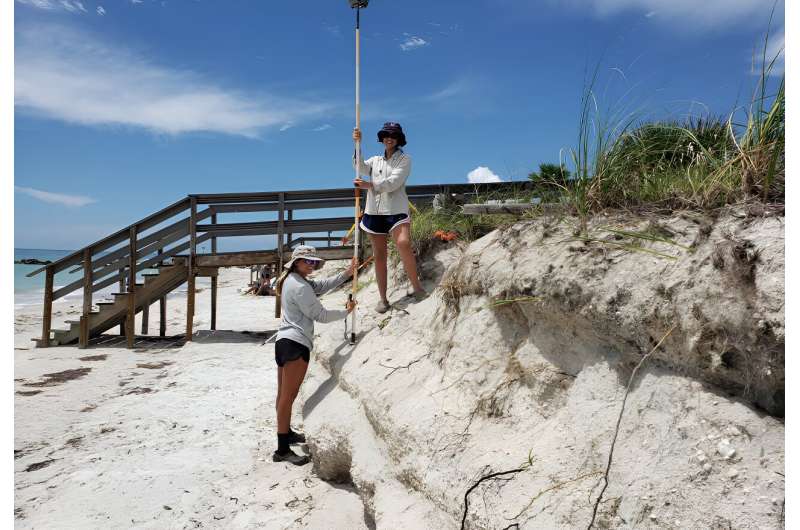This article has been reviewed according to Science X's editorial process and policies. Editors have highlighted the following attributes while ensuring the content's credibility:
fact-checked
trusted source
proofread
'The perfect storm': Hurricane Idalia leaves Florida beaches vulnerable to future inclement weather

A University of South Florida expert on erosion and coastal resiliency is working with Pinellas County to help identify beaches in need of nourishment following Hurricane Idalia, which washed away parts of the coast as it roared past Tampa Bay earlier this month.
"There are exposed seawalls that I haven't seen in 20 years," said geosciences Professor Ping Wang. "This storm has really left our shores in a vulnerable state for the winter and any potential storms that may come next."
Wang has been surveying the Florida coast for more than two decades, studying the processes that cause erosion and other impacts storms have on the natural environment. His efforts have helped county leaders determine where and how much sand to distribute along the west central coast—an operation that takes place every five to seven years.
"The data collection the University of South Florida's Coastal Research Laboratory has obtained over the past few decades has made them indispensable when it comes to the planning and monitoring of our coastline, and one of just a few examples of what a successful partnership looks like," said Zachary Westfall, coastal scientist for Pinellas County.
"Most of our beach today is man-made—we've been systematically building up our coast and our beaches for much of my career," Wang said. "It's important to have a wider beach and a dune system as it's the first line of defense to a storm impact, providing better protection to inland structures, such as homes and roads."
Days before Idalia made landfall, Wang and his graduate students surveyed Pinellas County beaches—something they do each quarter to document changes to the beaches' length and width.
"With a fresh image in our head of what the beach had looked like, the post-storm beach was shocking," said graduate student Sophia Gutierrez, who is researching storm-induced beach erosion and beach nourishment. "The beach erosion we observed on the Pinellas County coast was the worst I have seen since studying the area."
Wider beaches can help absorb the impact of a storm, but when the beach is narrow and low, the water and waves easily rise above the beach and wash away the sand, causing erosion. Prior to Hurricane Idalia, much of Pinellas County's shoreline was already vulnerable as there hadn't been a beach nourishment since in 2018. The high waves and the elevated sea level brought by Idalia created "the perfect storm," according to Wang, for beach and dune erosion.
"We likely lost all the sand we put down five years ago. Some places may have even lost sand from the previous nourishment," Wang said. "The beach just wasn't in the best shape to adsorb the big waves and high water."
"The dunes in Pinellas County have been naturally growing for the past 10–30 years," Gutierrez said. "Dunes provide immense protection to inland structures because of their high, natural elevations. Seeing the dunes in the state they are in post-Idalia is devastating and unprecedented."
With much of the shorelines' protection washed away, Wang says the beaches won't be able to withstand the impact of a future storm and therefore, could result in direct damage to nearby structures, docks, sea walls and roads.
According to Westfall, the county regularly utilizes data gathered by Wang and his students to aid in developing reports, including the annual beach performance report, document hurricane damage and conduct inlet management studies.
Provided by University of South Florida




















